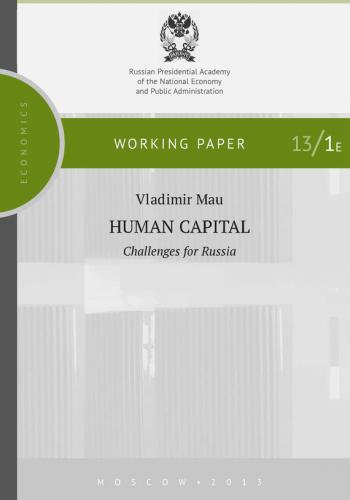The increasingly global nature of services: Educational and health-care institutions are competing not only with schools and hospitals in their own neighbourhood but with similar institutions throughout the country and throughout the world. Of course, this degree of choice is not available to everyone, but as standards of living improve and the real cost of these services and of travel falls as a result of global competition, more and more people will participate. Opportunities for building up personal savings in a global financial system will mean that pensioners will be less and less dependent upon the pension system of their own country.
An increase in the importance of private expenditure in the development of human capital (this is a logical accompaniment of the previous three trends). The first three trends point to a growth of opportunities for people to purchase the services that they need. This means that the role and the importance of individual demand will increase, eventually overtaking the volume of state expenditure in the sectors in question. Private purchase of services, or shared state-private purchase, are not only a natural development, they are the inevitable consequence of the technological modernization of these sectors and of an increase in the living standards of the population. The increase in private expenditure is associated with the fact that any further increase in state expenditure became impossible towards the end of the twentieth century: any increase in taxation was impossible, while the demand of the population for social services continued (and continues) to increase, in line with social progress.
The increasing importance of new technologies. These are radically transforming the nature of service-delivery. As information and communications technologies and transport technologies continue to develop, traditional forms of healthcare and education are withering away. Innovations in systems of organization are having a similar impact.
All of these trends must be taken into account since they are making for a modernization not only of the human capital sectors, but contributing to the political and economic modernization of the entire country, including that of our technological infrastructure. Ignoring these trends creates a risk that Russia will continue to lag behind or will lag even further behind, the socio-economic development of the developed countries.
The process of globalization makes for an intensification of competition and this is also true of institutional competition in the market of human capital. In the immediate post-Communist period many argued that we had inherited a high level of development of human capital, in particular in the quality of our systems of education and healthcare. It was frequently maintained that in Russia the level of development of human capital was high by comparison with our level of economic development.
The data provided in the accompanying table indicate that the picture is not so positive. In a ranking based on level of social and economic development, our systems of education and healthcare approximately correspond to our level of per capital GDP. However, the indicator for quality (outcome) of healthcare (life expectancy) in Russia is in steep decline. Reversing this trend will not be easy.
The fact of the matter is that if an advanced system of education or healthcare is to be created there has to be a demand for high quality educational and healthcare services. This is how these sectors developed until recently.
However, the explosive development of communications and transportation systems has made for a steep reduction in the transaction costs of switching from a national system of delivery of these services to a global system. It is now much easier than it was 20 years ago to enrol in any university (if the applicant has passed the necessary exams) or to receive healthcare in any clinic throughout the world. This costs money, but as the economy grows the disposal income of the Russian citizen will also grow, and, as experience shows, Russians are prepared to invest in themselves – in their education and healthcare.
Конец ознакомительного фрагмента.
Текст предоставлен ООО «ЛитРес».
Прочитайте эту книгу целиком, купив полную легальную версию на ЛитРес.
Безопасно оплатить книгу можно банковской картой Visa, MasterCard, Maestro, со счета мобильного телефона, с платежного терминала, в салоне МТС или Связной, через PayPal, WebMoney, Яндекс.Деньги, QIWI Кошелек, бонусными картами или другим удобным Вам способом.
